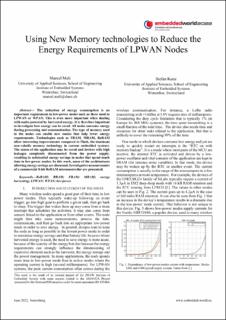Please use this identifier to cite or link to this item:
https://doi.org/10.21256/zhaw-26921| Publication type: | Conference paper |
| Type of review: | Peer review (abstract) |
| Title: | Using new memory technologies to reduce the energy requirements of LPWAN nodes |
| Authors: | Meli, Marcel Kunz, Stefan |
| et. al: | No |
| DOI: | 10.21256/zhaw-26921 |
| Proceedings: | Proceedings of Embedded World Conference 2022 |
| Editors of the parent work: | Sikora, Axel |
| Conference details: | Embedded World Conference, Nuremberg, Germany, 21-23 June 2022 |
| Issue Date: | 23-Jun-2022 |
| Publisher / Ed. Institution: | WEKA |
| ISBN: | 978-3-645-50194-1 |
| Language: | English |
| Subjects: | Energy harvesting; Energy autonomous; FRAM; MRAM; ReRAM; Low-power; LPWAN; WPAN; Power management |
| Subject (DDC): | 621.3: Electrical, communications, control engineering |
| Abstract: | The reduction of energy consumption is an important requirement in low-power nodes such as those used in LPWAN or WPAN. This is even more important when dealing with nodes powered by harvested energy. It is therefore important to investigate how energy can be saved. All nodes consume energy during processing and communication. The type of memory used in the nodes can enable new modes that help lower energy requirements. Technologies such as FRAM, MRAM, ReRAM allow interesting improvements compared to Flash, the dominant non-volatile memory technology in current embedded systems. The status of the application may be saved and devices with high leakages completely disconnected from the power supply, resulting in substantial energy savings in nodes that spend much time in low-power modes. In this work, some of the architectures allowing energy savings are discussed. Investigative measurements of a commercial 8-bit ReRAM microcontroller are presented. |
| URI: | https://digitalcollection.zhaw.ch/handle/11475/26921 |
| Fulltext version: | Published version |
| License (according to publishing contract): | Licence according to publishing contract |
| Departement: | School of Engineering |
| Organisational Unit: | Institute of Embedded Systems (InES) |
| Appears in collections: | Publikationen School of Engineering |
Files in This Item:
| File | Description | Size | Format | |
|---|---|---|---|---|
| 2022_Meli-Kunz_Memory-technologies-reducing-energy-requirements-LPWAN-nodes_EW2022.pdf | 1.66 MB | Adobe PDF |  View/Open |
Show full item record
Meli, M., & Kunz, S. (2022). Using new memory technologies to reduce the energy requirements of LPWAN nodes [Conference paper]. In A. Sikora (Ed.), Proceedings of Embedded World Conference 2022. WEKA. https://doi.org/10.21256/zhaw-26921
Meli, M. and Kunz, S. (2022) ‘Using new memory technologies to reduce the energy requirements of LPWAN nodes’, in A. Sikora (ed.) Proceedings of Embedded World Conference 2022. WEKA. Available at: https://doi.org/10.21256/zhaw-26921.
M. Meli and S. Kunz, “Using new memory technologies to reduce the energy requirements of LPWAN nodes,” in Proceedings of Embedded World Conference 2022, Jun. 2022. doi: 10.21256/zhaw-26921.
MELI, Marcel und Stefan KUNZ, 2022. Using new memory technologies to reduce the energy requirements of LPWAN nodes. In: Axel SIKORA (Hrsg.), Proceedings of Embedded World Conference 2022. Conference paper. WEKA. 23 Juni 2022. ISBN 978-3-645-50194-1
Meli, Marcel, and Stefan Kunz. 2022. “Using New Memory Technologies to Reduce the Energy Requirements of LPWAN Nodes.” Conference paper. In Proceedings of Embedded World Conference 2022, edited by Axel Sikora. WEKA. https://doi.org/10.21256/zhaw-26921.
Meli, Marcel, and Stefan Kunz. “Using New Memory Technologies to Reduce the Energy Requirements of LPWAN Nodes.” Proceedings of Embedded World Conference 2022, edited by Axel Sikora, WEKA, 2022, https://doi.org/10.21256/zhaw-26921.
Items in DSpace are protected by copyright, with all rights reserved, unless otherwise indicated.